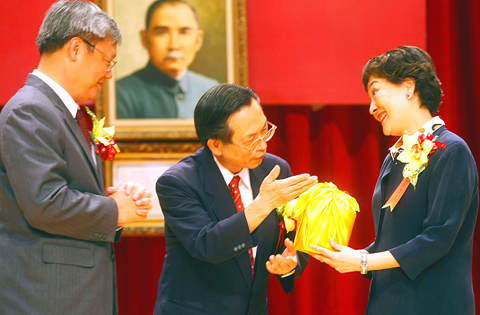Commissioners from the National Communications Commission (NCC) yesterday chose Bonnie Peng (彭芸), a journalism professor at National Chengchi University, as the new NCC chairwoman.
Commissioner Chen Cheng-tsan (陳正倉) was selected as the commission’s vice chairman. Chen is currently an economics professor at National Taiwan University.
The fact that Peng was elected was no surprise to many, as she was the only commissioner who clearly indicated that she “was willing to consider the possibility” of becoming chairperson during a review session at the Legislative Yuan last month.

PHOTO: CNA
Peng’s predecessor, Su Yeong-ching (蘇永欽), handed her the official seal during an inauguration ceremony yesterday morning.
While a ruling from the Council of Grand Justices in 2006 said that Su and the other eight commissioners could stay in their positions until December this year, the NCC members decided to step down early in January. However, their resignation was postponed as the Executive Yuan had trouble finding replacements.
Su said in a speech yesterday that the appointment of the new NCC commissioners came at a perfect time.
He said that he believed that the commission could run independently and would “try not to be too cozy” with the Executive Yuan.
Peng, on the other hand, said what she could bring to the commission was the aspiration to “dream big.”
“While we are seeking advancement in communication technology, we also need to pay attention to issues concerning cultural diversity and take care of the economically disadvantaged,” she said.
In addition to Peng and Chen, the other five commissioners — Hsieh Chin-nan (謝進男), Liu Chorng-jian (劉崇堅), Weng Hsiao-ling (翁曉玲), Lee Ta-sung (李大嵩) and Chung Chi-hui (鍾起惠) — met with reporters for the first time and talked about what and how they could contribute to the operations of the NCC.
Weng, an expert in technology law and the legal specialist on the team, said she aims to address similarities and differences among different communications laws and try to impose one consistent regulation on all telecom service operators.
Lee said he would address issues concerning more efficient use of the nation’s radio spectrum and new communications platforms.
Chung, on the other hand, said she would aim to reinforce the self-discipline of the media.

CAUTION: Based on intelligence from the nation’s security agencies, MOFA has cautioned Taiwanese travelers about heightened safety risks in China-friendly countries The Ministry of Foreign Affairs (MOFA) yesterday urged Taiwanese to be aware of their safety when traveling abroad, especially in countries that are friendly to China. China in June last year issued 22 guidelines that allow its courts to try in absentia and sentence to death so-called “diehard” Taiwanese independence activists, even though Chinese courts have no jurisdiction in Taiwan. Late last month, a senior Chinese official gave closed-door instructions to state security units to implement the guidelines in countries friendly to China, a government memo and a senior Taiwan security official said, based on information gathered by Taiwan’s intelligence agency. The

The National Immigration Agency (NIA) said yesterday that it will revoke the dependent-based residence permit of a Chinese social media influencer who reportedly “openly advocated for [China’s] unification through military force” with Taiwan. The Chinese national, identified by her surname Liu (劉), will have her residence permit revoked in accordance with Article 14 of the “Measures for the permission of family- based residence, long-term residence and settlement of people from the Mainland Area in the Taiwan Area,” the NIA said in a news release. The agency explained it received reports that Liu made “unifying Taiwan through military force” statements on her online

Taiwan Semiconductor Manufacturing Co (TSMC), the world’s largest contract chipmaker, said yesterday that it is looking to hire 8,000 people this year, at a time when the tech giant is expanding production capacity to maintain its lead over competitors. To attract talent, TSMC would launch a large-scale recruitment campaign on campuses across Taiwan, where a newly recruited engineer with a master’s degree could expect to receive an average salary of NT$2.2 million (US$60,912), which is much higher than the 2023 national average of NT$709,000 for those in the same category, according to government statistics. TSMC, which accounted for more than 60 percent

Tung Tzu-hsien (童子賢), a Taiwanese businessman and deputy convener of the nation’s National Climate Change Committee, said yesterday that “electrical power is national power” and nuclear energy is “very important to Taiwan.” Tung made the remarks, suggesting that his views do not align with the country’s current official policy of phasing out nuclear energy, at a forum organized by the Taiwan People’s Party titled “Challenges and Prospects of Taiwan’s AI Industry and Energy Policy.” “Taiwan is currently pursuing industries with high added- value and is developing vigorously, and this all requires electricity,” said the chairman